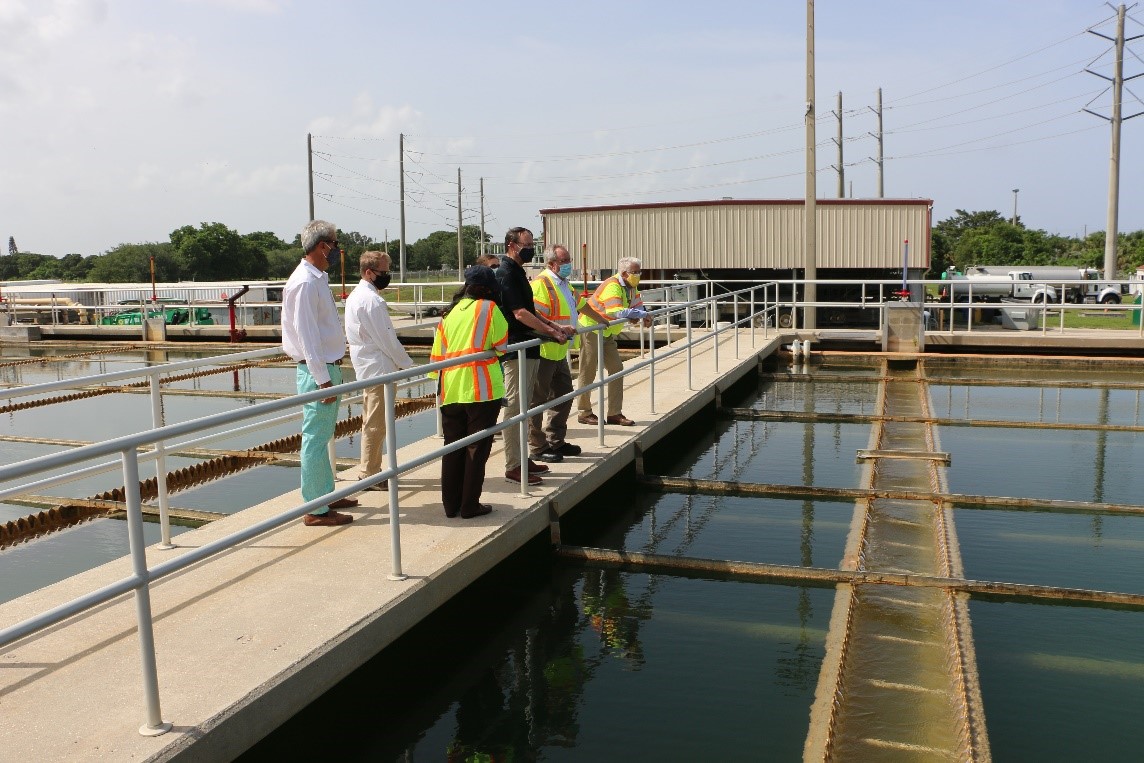
Cyanotoxin Expert Panel tours the Water Treatment Plant along with representatives from the Town of Palm Beach
WEST PALM BEACH, FL (August 26, 2021) – During a Mayor/Commission Work Session on August 26, 2021, the City of West Palm Beach Cyanotoxin Expert Panel (“the Panel”), presented their recommended near-term actions to address potential water quality risks from cyanotoxins.
For 60 days, the Panel has been digging into the city’s vast and well-documented water quality data and conducting additional studies to analyze source water, treatment infrastructure, and operations. Assembled by Mayor Keith A. James in June, the Panel, which is comprised of water quality industry leaders and experts in their field, was tasked with making near-term and long-term recommendations to Mayor, City Administration, and the Department of Public Utilities.
Short-term recommendations provided by the Panel include, but are not limited to:
- Continue to understand and better manage source water through enhanced monitoring, modeling, and advanced data analytics.
- Optimize powdered activated carbon treatment using bench-scale testing and revised procurement strategies.
- Optimize chlorine oxidation by collecting additional bench- and full-scale data to balance chlorine oxidation of cyanotoxins and disinfection byproduct formation.
In response to the Panel’s guidance, the city has already taken several actions for source water and treatment, including:
Source Water:
- Collaborative effort between the Panel and the city’s Water Evaluation and Planning and Groundwater Model team to evaluate water quantity, quality, and source management strategies.
- A source water study to determine the best depth from which to pull water from Clear Lake to improve water quality entering the treatment plant.
Treatment:
- Looking at water treatment plant operations to maximize the effectiveness of existing powdered activated carbon and chlorine treatment steps. Early results show good potential to remove cyanotoxins.
- A water treatability study to identify the best-suited type of powdered activated carbon to optimize treatment performance.
“The Panel has taken an in-depth look at our water quality data over the past 60 days,” said Dr. Poonam Kalkat, Director of Public Utilities. “The good news is that existing treatment steps at our plant are able to remove the low levels of cyanotoxins in the source water, and some adjustments may make it even more effective.”
“Our recommended near-term actions focus on getting the best out of the city’s available tools to help manage the source water and optimize treatment performance,” said Dr. Robert Cushing, Cyanotoxin Expert Panelist.
With many near-term actions underway, the Panel will now shift focus to look at longer-term source water quality and treatment strategies during the next 8 to 10 months. Throughout, the city will continue to provide updates to the community and share information with the Town of Palm Beach and Town of South Palm Beach.
The city is also taking part in a Water Research Foundation Study with 30 peer agencies across the nation.
“We’re excited to be part of this industry-leading study looking at new technologies that could serve as an early warning system for water quality concerns like cyanotoxins,” said Dr. Kalkat.
“I am pleased with the hard work, commitment and expertise of the Cyanotoxin Expert Panel and greatly appreciate their near-term recommendations,” said West Palm Beach Mayor Keith A. James. “We remain committed to the protection of our water and to the provision of clean, safe drinking water for West Palm Beach water customers. I look forward to the panel’s continued work and their long-term recommendations.”
To help keep the community informed, the city recently launched a ‘Protecting Water Quality—Source to Tap’ webpage, which can be found on the city website, wpb.org. Community members can find information about water quality, the panel’s work, and the city’s water sources and treatment steps.
The city continues to sample weekly, and there have been no detections of cyanotoxins in the treated drinking water.